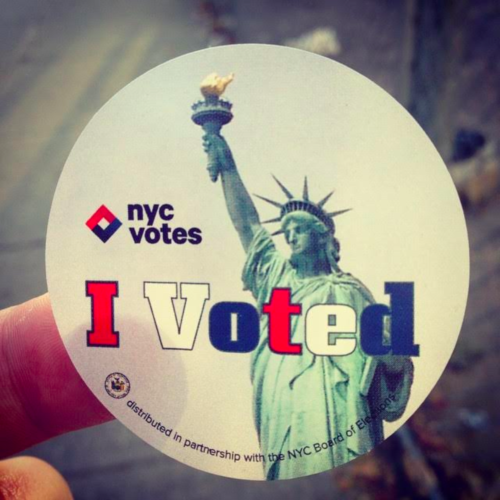By Emily Graham
Every four years, in the afterglow of another election season, the question emerges. You know the one: “Is it time we eliminate the Electoral College?â€
Pundits and prognosticators make the rounds on the Sunday talk shows, discussing the likelihood of a constitutional amendment’s passage. Columnists weigh in, historians debate the true intent of our Founding Fathers, and online petitions flood our Facebook feeds.
Here’s the hard truth: It ain’t gonna happen. Democrats have too much to gain, and small states have too much to lose, for the GOP to ever consider such a change.
But for those looking to rehabilitate our democracy – to make it fairer and more representative of the people’s will in the 21st century – the state of Maine (yes, Maine) offers a path forward. It’s called ranked-choice voting (RCV).
Don’t be put-off by the seemingly arcane and patently unsexy name. The voting procedures it describes are really quite simple: voters rank candidates for elected office in order of preference. Votes are tallied based on all of the voters’ first choices, and if a candidate receives more than half of the total votes cast, that candidate wins.
If no candidate reaches the fifty percent-threshold, the candidate in last place is pulled from consideration, and the votes are counted again. When votes are recounted, an individual’s second-choice candidate is tallied if his or her first choice has been eliminated. This process continues until a candidate receives a majority of votes.
Put another way: With RCV, Joe Elector selects Jill Stein as his first choice in the election, because, hey, he doesn’t love Hillary Clinton and thinks she’s in bed with Wall Street. But Joe Elector prefers Hillary Clinton to Donald Trump, and ranks her second accordingly.
Joe Elector’s vote is recorded for Jill Stein. But assuming Stein doesn’t reach the fifty percent-minimum in his state, she is eliminated from the count in round two, and Joe Elector’s vote for Clinton is tallied instead.
RCV, in effect, represents the end of the protest vote. Its enactment ensures that third-party candidates are no longer spoilers, but instead healthy and welcome additions to the political arena. It renders obsolete the “Nader-effectâ€â€”so called because of the damaging impact that Ralph Nader, an independent candidate in 1999, is believed to have had on Al Gore’s chances of victory.
Minimal data exists to evaluate the effects of RCV on elections. Maine became the first state, by ballot initiative no less, to amend its voting system this fall, joining the ranks of San Francisco, Oakland and the Twin Cities. But the limited data we have – plus more than a century of two-party rule – gives us a sense of what we could expect from a radically new voting system nationwide.
To start, RCV as a practice discourages negative political campaigning. A 2013 Rutgers-Eagleton Institute of Politics poll found that likely voters in cities with RCV viewed their local election campaigns as less negative than their counterparts in non-RCV municipalities. And that makes sense. Candidates would take care not to attack one another, for fear of alienating their opponent’s base and losing out on the coveted second-choice spot.
But it goes beyond America’s distaste for negative advertising – we’re just plain unhappy with the state of politics. A 2016 University of Chicago poll found that a mere  ten percent of Americans have a great deal of confidence in the country’s political system, and only 13 percent feel our two-party structure works.
RCV presents a remedy, and an attainable one. It gives third- (and fourth-, and fifth-) party candidates a legitimate stake in an election, and invites citizens to cast their vote for such candidates without fear of throwing their vote away.
Critics of RCV point to the fact that in the 2016 election, 42 U.S. states used voting machines more than a decade old. They argue that replacing or updating these prehistoric machines to incorporate RCV technology would be cost-prohibitive.
While opponents are justified in this critique, they ought to look at the other side of the balance sheet as well: RCV would eliminate traditional run-off elections altogether. Eleven states have provisions for run-offs, which are costly to execute. Alabama taxpayers, for example, spent $3 million on a 2014 runoff race. In any case, even with RCV off the table, there is a need to modernize our voting machines. Besides, citing geriatric machines as a reason to reject RCV is like someone saying the Internet is unwelcome because he only has a type-writer.
Maine, though, is not among the “run-off†eleven. So why did the Pine Tree State become the first in the nation to enact RCV? Mainers introduced the ballot initiative after a brash, hot-headed and Tweet-happy politician was twice elected to the governor’s mansion – with 38 percent of the vote in a four-way race in 2010 and 48 percent in a three-way contest in 2014. Mainers claim – justifiably – that their governor does not represent a majority of the state’s population. Yet Paul LePage lives, all the same, in the governor’s mansion in Augusta.
Sound familiar? States legislators should take one look at who resides at 1600 Pennsylvania Avenue in Washington and follow Maine’s lead.




